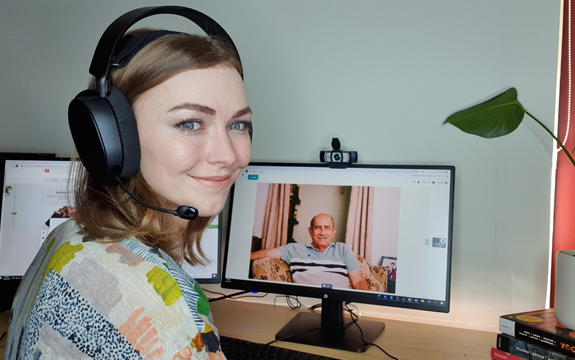
This service is delivered by provisionally registered psychologists, social work interns and counselling postgraduates
Swinburne’s Wellbeing Clinic for Older Adults has launched a free national telehealth counselling and support service to provide emotional support to older adults living in residential aged care facilities. This national, specialised service, which launched on Friday, 15 May, is available to aged care residents and their families as well as aged care workers.
“Many aged care facilities across the country have imposed very tight restrictions on face-to-face visits as a safety measure to reduce the risk of coronavirus (COVID-19) infections, and we anticipate that this will result in increased feelings of anxiety, loneliness and isolation among residents, their family members and aged care workers,” says the clinic’s co-director, Professor Sunil Bhar.
A history of caring for older Australians
Swinburne’s is a confidential counselling and support service for older adults living in residential and community settings developed in 2011. This service is delivered by psychology, counselling and social work students through Swinburne.
This telehealth service, which will be delivered via phone and video calls aims to provide valuable support for this group of people as they navigate through the COVID-19 situation. It is envisaged to be a valuable additional program, especially in areas where such support services are limited.
An initial trial of this service, which was conducted in seven residential aged care facilities in response to COVID-19 restrictions, yielded encouraging results.
“Older adults in residential aged care facilities have been embracing video communication. Many of them loved the opportunity to maintain social connections while learning how to use technology,” says Swinburne student and one of the clinic’s provisional psychologists, Aida Brydon.
Building the future mental health workforce
This free service will be delivered by counsellors consisting of provisionally registered psychologists, social work interns and counselling postgraduates who will be supervised by experienced practitioners. The initiative will create placement opportunities for students at higher education institutions across the country.
Clinic coordinator, Mark Silver adds, “this program will not only provide emotional support for older adults in these facilities, but it will also provide the training knowledge, experience and skills needed in building up the future mental health workforce in aged care.”
“There are nearly 3,000 aged care facilities in Australia and we anticipate that there will be a great need for this free and accessible service. Unlike a crisis hotline, our service will link a counsellor to a client, so they can continue to converse over several weeks or months,” Professor Bhar concludes.








